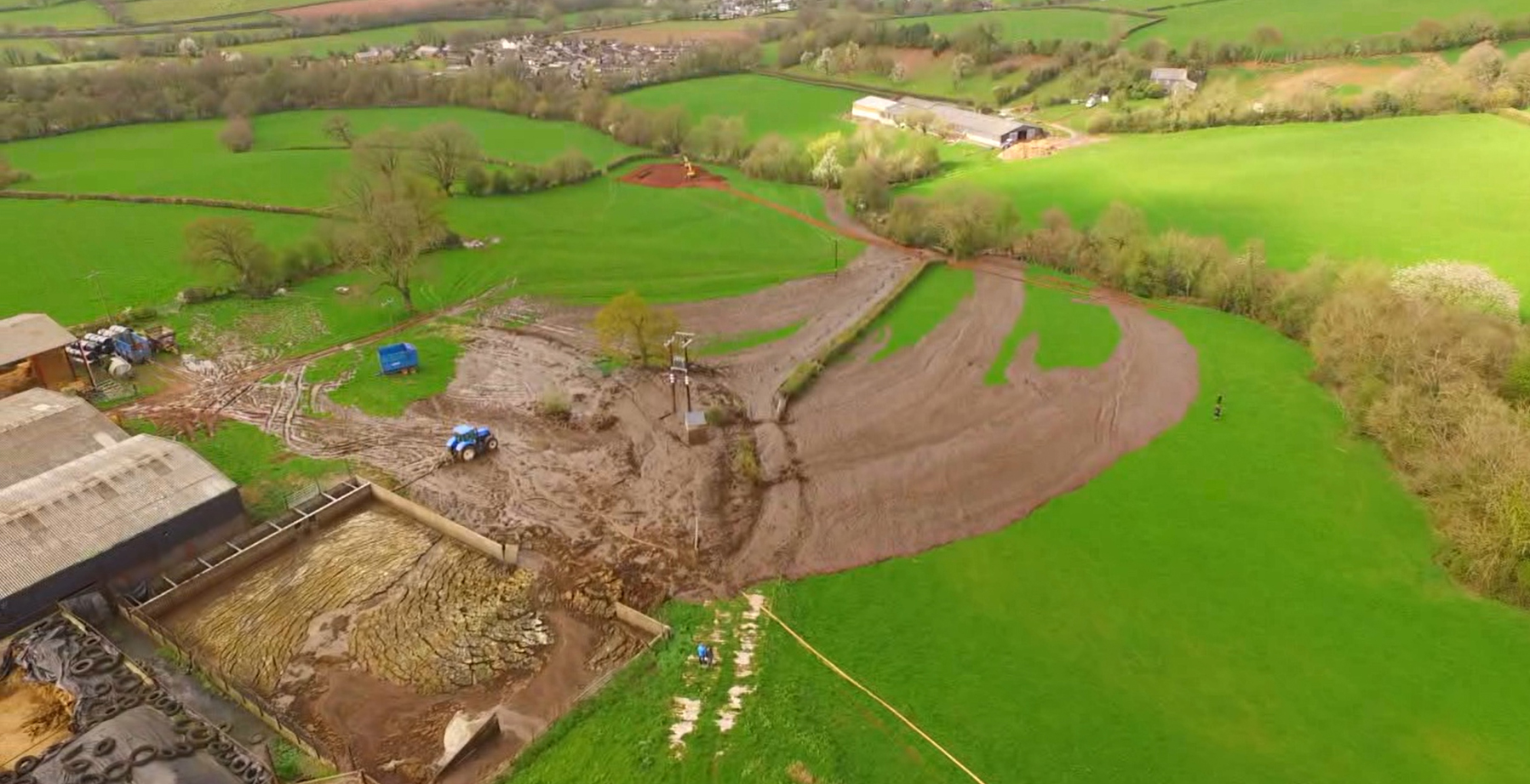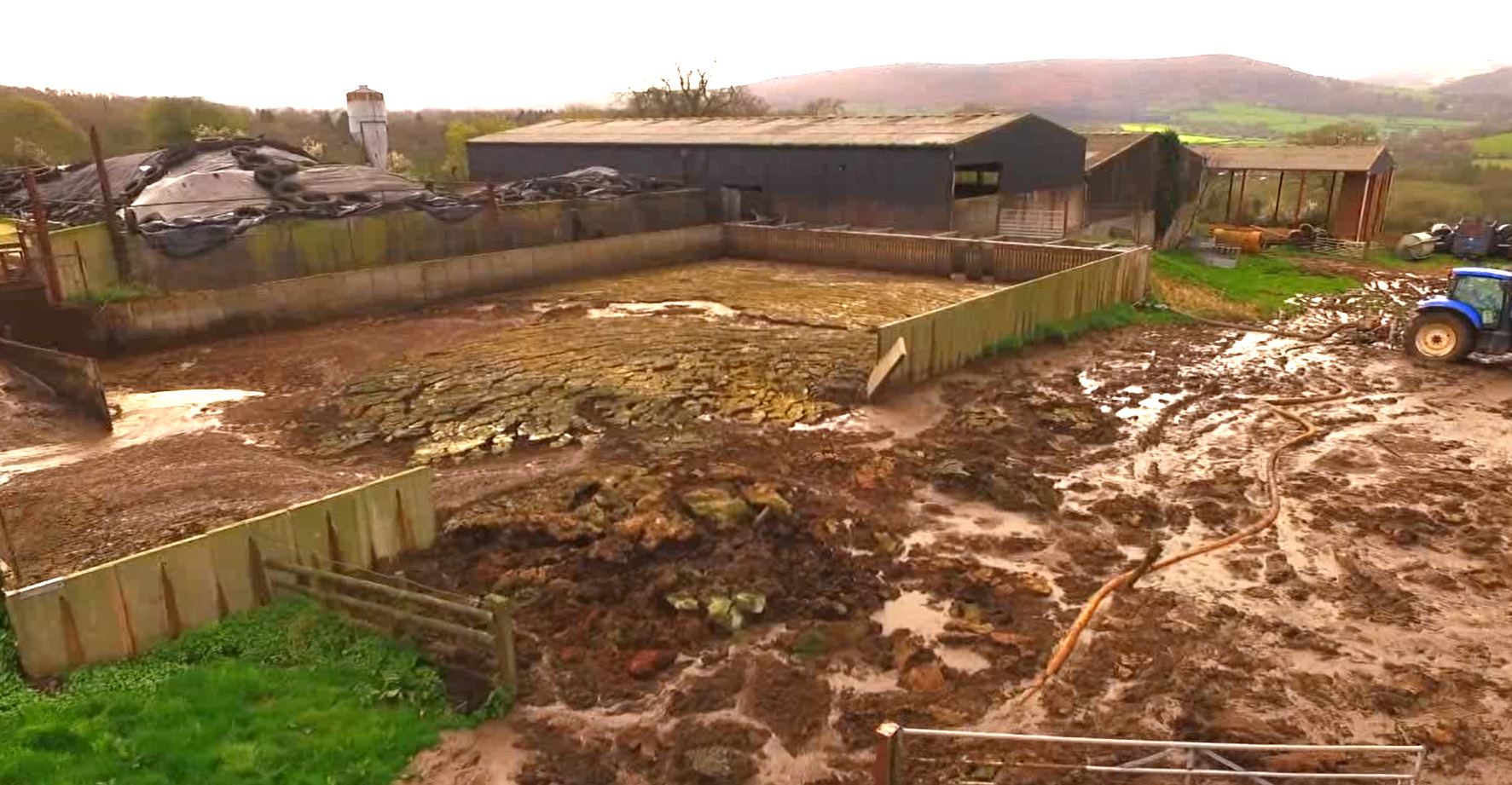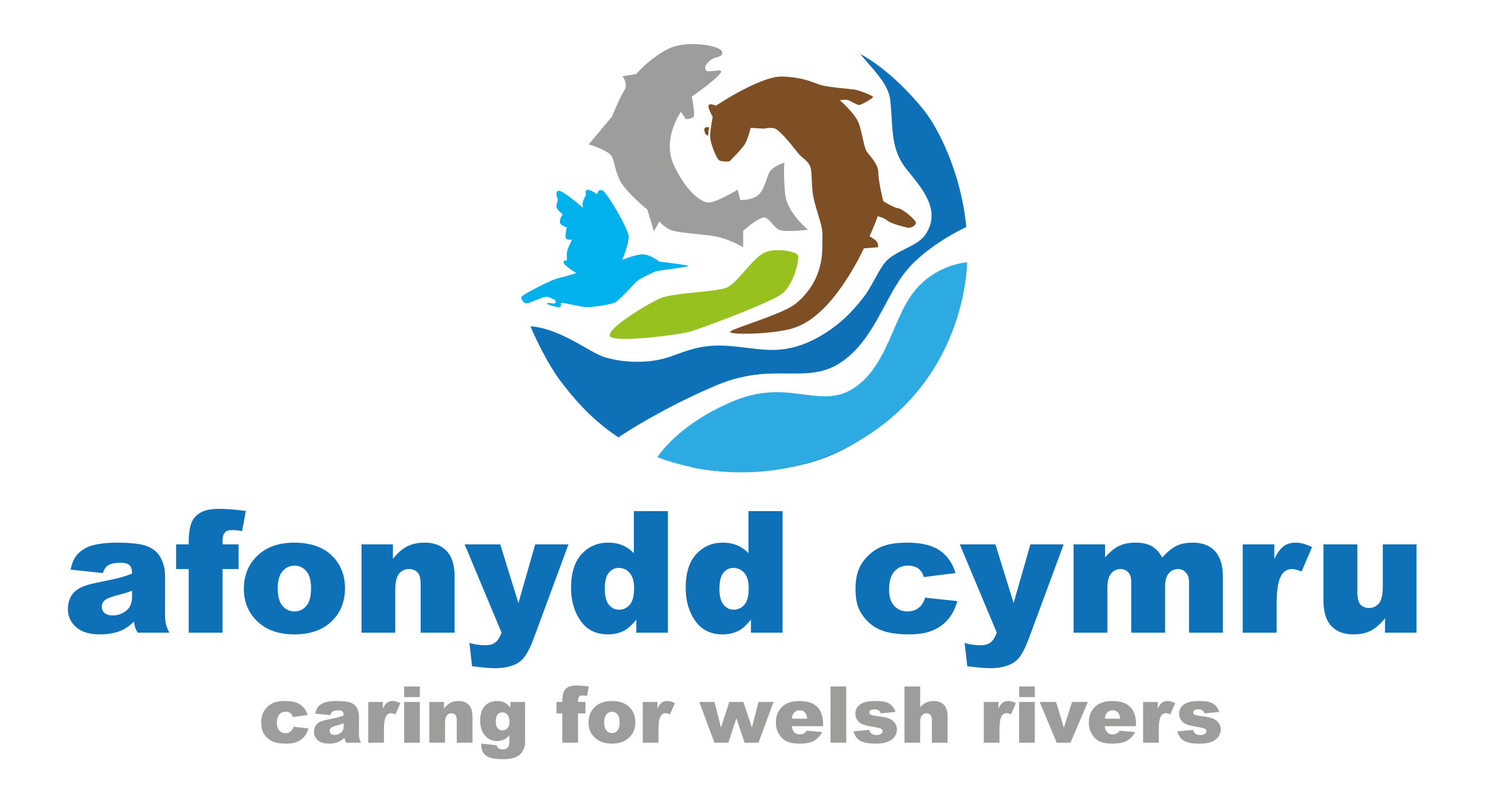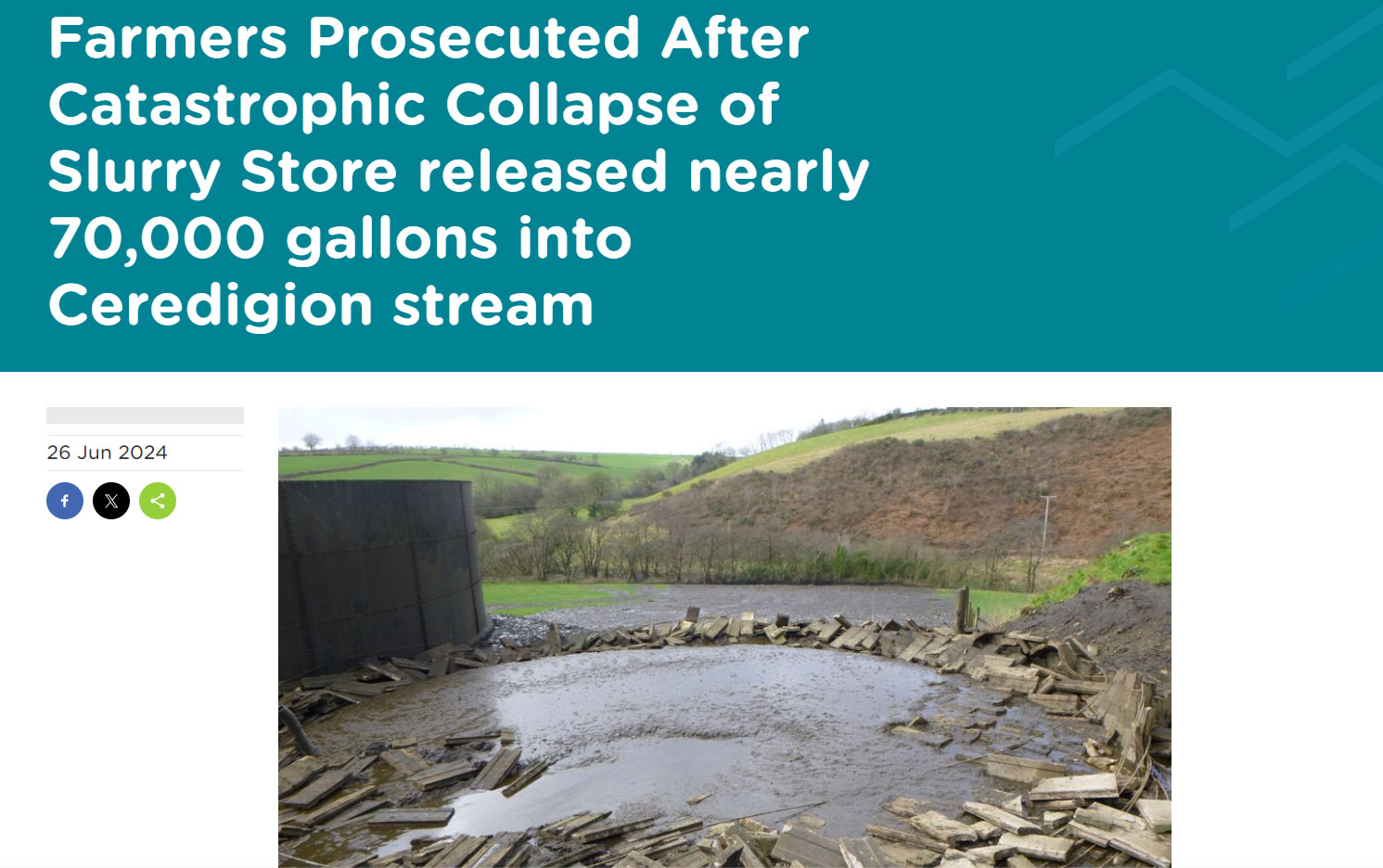A recent prosecution brought by Natural Resources Wales raises questions about the regulation and enforcement of agriculture and the threat to rivers posed by old or poorly maintained slurry stores
Monday 8th July, 2024
On 26th June Natural Resources Wales announced that they had successfully prosecuted a farm in Ceredigion for polluting 12km of a feeder stream of the Afon Clettwr, itself a tributary of the Teifi.
The pollution took place in February 2022 when the farm’s slurry store collapsed. Built in the 1970s, it had received no formal maintenance in the last ten years other than visual inspection. In court, Natural Resources Wales contended that the facility was being used beyond its lifespan.
Up to 70,000 gallons of slurry were released into the stream causing a fish kill.
The Clettwr case raises several important questions, the first being why did it take nearly two and a half years from the offence being committed to the defendant company being sentenced?
It is important that serious environmental offences are dealt with by the courts but it is also important that such matters are dealt with speedily. This prevents unnecessary stress on the polluting farmer who in this case, reported the incident on the day. Where a trial is needed, it also ensures witnesses’ memories of events are as accurate as they can be and not clouded by the passage of time.
Not the first time
Worryingly, the Clettwr pollution is not a one-off case. Slurry stores have caused numerous and sometimes catastrophic pollution in Wales in the recent past.
In 2017, a lagoon wall failed in Pandy, Monmouthshire, releasing 99,000 gallons of slurry down a hill towards the Honddu, a tributary of the river Monnow. Only the prompt action of Natural Resources Wales prevented a catastrophic pollution.
Other rivers have been less fortunate. In 2018, much of the 75,000 gallons of slurry from a tank in Anglesey ended up in the Afon Gwna. In June 2020, 75,000 gallons of slurry entered the Afon Peris in Ceredigion from a collapsed 40-year-old tank, causing a major fish kill.Â

The slurry store collapse near Pandy in Monmouthshire in 2017. The slurry flowed down the hill towards the Afon Honddu, a tributary of the Monnow (Wye). Only quick action by Natural Resources Wales prevented a major catastrophe.Â
Are the fines enough?
Following last week’s Clettwr case announcement, there was some disgruntlement on social media about the level of fine imposed on the polluter ““ just £5,000 (plus costs). This was still larger than fine issued in the Peris case, where two defendants were fined a combined £2,468.
In fairness to Natural Resources Wales, setting the level of fine is not their responsibility. This is the decision of the court, who follow the sentencing guidelines for environmental offences published by the sentencing Council. The court sets the fine level based on many factors, including the culpability of the offender, the harm done and the farm business income.
Questions have been raised over whether the level of fine imposed amounts to an incentive to others to meet regulatory compliance.
Other farm businesses will be facing substantial expenditure for maintaining or building new slurry stores. Might they assess this expenditure against the risk of pollution and suffering a comparatively small fine, and put off necessary but non income producing investment?
The Clettwr case raises questions over whether prosecutions are taking too long and whether the penalties imposed provide an effective deterrent.

The slurry store wall that failed at Pandy. How many aging or poorly maintained tanks are out there threatening Welsh rivers? The regulator does not seem to know.
“Enforcement Undertakings”
While larger fines create more of an incentive not to pollute, it must be remembered that none of the money goes into restoring the damage caused by the pollution. Other legal options, such as civil cases are better in this respect, securing damages from polluters to pay for restoration.
One alternative to prosecution that regulators have been using increasingly are enforcement undertakings. In the simplest of terms, these are where polluters donate an amount of money to a local project to make good the damage caused. Their advantage is that unlike prosecutions, they are (usually) quick, do not use up significant regulator resource and all the money goes back into restoration.
However, they have limitations too. Enforcement undertakings were originally designed for minor technical breaches where no damage to the environment had resulted and for one-off, low-level offenders.
When the public interest demands a prosecution, then a prosecution should usually follow. Enforcement undertakings should not be seen as a convenient way of raising revenue. Offenders should not escape prosecution merely because they can afford the payment of a substantial sum under an enforcement undertaking.
NRW’s limited options
Natural Resources Wales are currently limited in the range of offences for which they can use enforcement undertakings. A revision to these is currently under consideration by Welsh Government and more enforcement tools being made available to the regulator would be welcome, such as the power to impose fixed and variable penalties.
The kind of restoration order issued across the border by the Environment Agency in the recent case of damage to the river Lugg is not currently an option for the regulator in Wales. However, while these additional tools need to be added to the regulator’s list of options, they too should not be used when the public interest demands prosecution.
The tragic irony in Wales is that the slurry tanks most likely to fail are those exempt from the regulations.
Could we see more pollution incidents from failed slurry tanks in the future?
In Wales, the slurry storage facilities are now subject to rules under the Water Resources (Control of Agricultural Pollution) (Wales) Regulations 2021. However, these rules only apply to storage facilities built after 1st March, 1991.
Rather ironically, the most vulnerable storage tanks likely to fail are the very ones that are exempt.
Natural Resources Wales have been unable to answer our requests about how many pre-1991 slurry tanks are still in use (despite registration being part of the regulations).
The regulator has power to serve notice on any person having custody or control of a slurry store to carry out works, take precautions or other steps for reducing to a minimum any risk of pollution to controlled waters. Perhaps it is now time for Natural Resources Wales to establish the location of all such structures and inspect them or for the 1991 exemption to be removed?
The importance of the Clettwr case goes beyond a serious pollution of a tributary of a SAC river. It highlights the issue of delay in proceedings. It raises the question of whether the working of the sentencing guidelines results in penalties which not only punish those who commit environmental crimes but also provide sufficient deterrent to others to take advice and put their house in order before catastrophic pollution occurs. It also highlights the need for the 1991 exemption to be removed or the regulator to establish an inspection regime for all ageing structures but, particularly, those built before 1st March 1991.

